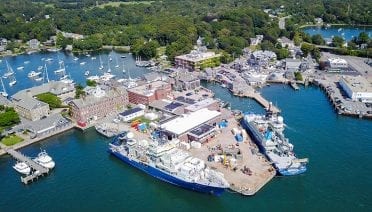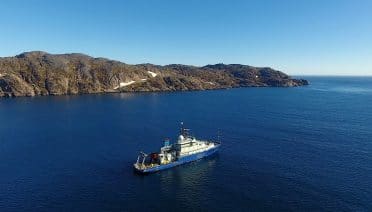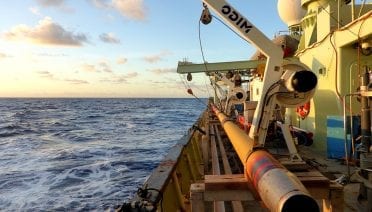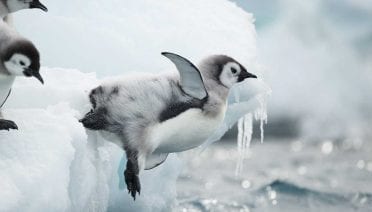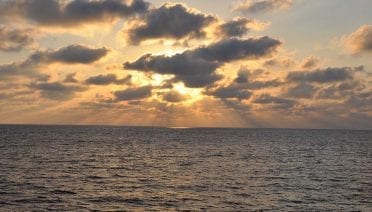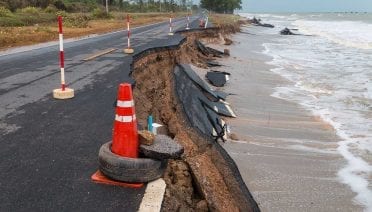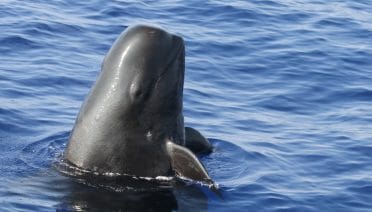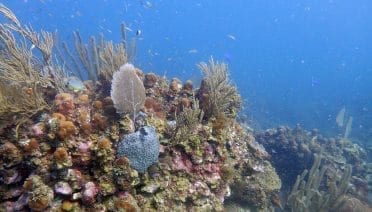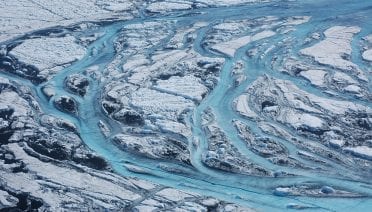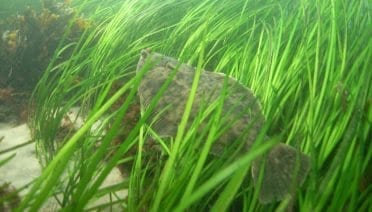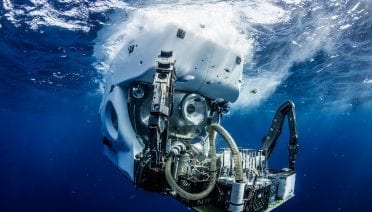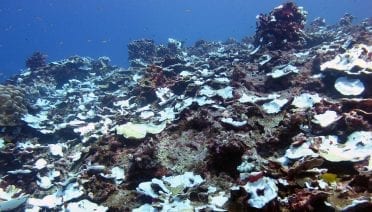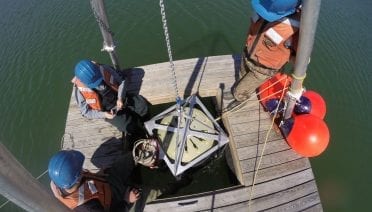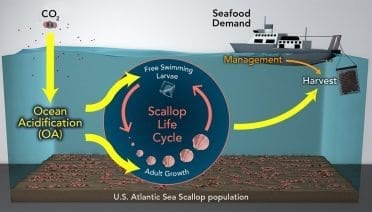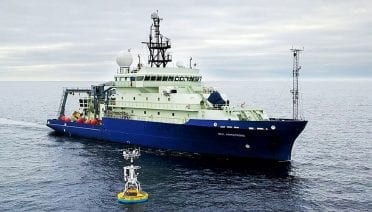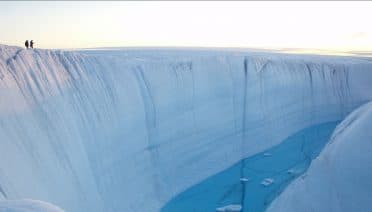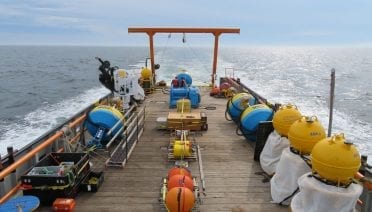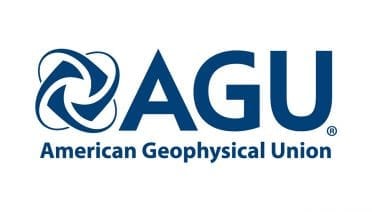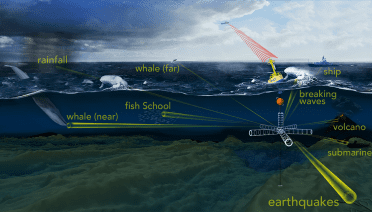Press Room
Members of the Massachusetts Seaport Economic Council (SEC) gave the green-light to a $1 million grant proposal from the Town of Falmouth and Woods Hole Oceanographic Institution (WHOI). The SEC, chaired by Lieutenant Governor Karyn Polito, promotes economic growth in the maritime sector through competitive grants to municipalities and their partners.
In the Atlantic MOC, warm, salty, shallow waters are carried northward from the tropics by currents and wind, and then converted into colder, fresher, deep waters that return southward through the Iceland and Irminger basins. In a departure from the prevailing scientific view, the study shows that most of the conversion from warm to cold water – or ‘overturning’ and its month-to-month variability – is occurring in regions between Greenland and Scotland, rather than in the Labrador Sea off Canada, as many past modeling studies have suggested.
Far below the ocean floor, sediments are teeming with bizarre zombie-like microbes. Although they’re technically alive, they grow in slow motion, and can take decades for a single cell to divide – something their cousins at the surface do in a matter of minutes. A new study from the Woods Hole Oceanographic Institution (WHOI) is beginning to pick apart how they survive by examining their source of food, nearby molecules of organic carbon. The study helps further our understanding of the limitations of life on Earth and could help inform how life might exist on other planets.
The paper, published Jan. 17, 2019, in the journal Marine Ecology Progress Series, also highlights the unique connection between juvenile diving behaviors and a layer of the ocean, known as the thermocline, where warmer surface waters meet cooler deep waters below and where their prey likely gather in groups.
Researchers from the Woods Hole Oceanographic Institution (WHOI) and Harvard University have found that the deep Pacific Ocean lags a few centuries behind in terms of temperature and is still adjusting to the entry into the Little Ice Age. Whereas most of the ocean is responding to modern warming, the deep Pacific may be cooling.
Sea levels are rising globally from ocean warming and melting of land ice, but the seas aren’t rising at the same rate everywhere. Sea levels have risen significantly higher in some U.S. East Coast regions compared to others. A new study led by the Woods Hole Oceanographic Institution (WHOI) reveals why.
In humans, different social groups, cities, or regions often have distinct accents and dialects. Those vocal traits are not unique to us, however. A new study from the Woods Hole Oceanographic Institution (WHOI) has found that short-finned pilot whales living off the coast of Hawai’i have their own sorts of vocal dialects, a discovery that may help researchers understand the whales’ complex social structure.
Choosing a place to call home is one of the most consequential choices a coral can make. In the animal’s larval stage, it floats freely in the ocean, but once it settles down, it anchors itself permanently to the rocky substrate of a reef, and remains stuck there for the rest of its life. Exactly how these larvae choose a specific place to live, however, is largely unclear.
Surface melting across Greenland’s mile-thick ice sheet began increasing in the mid-19th century and then ramped up dramatically during the 20th and early 21st centuries, showing no signs of abating, according to new research published Dec. 5, 2018, in the journal Nature. The study provides new evidence of the impacts of climate change on Arctic melting and global sea level rise.
In the late 1980s, more than three-quarters of the winter flounder caught in Boston Harbor – one of the most polluted harbors in America – showed signs of liver disease, many of them with cancerous tumors. But now, a scientist at Woods Hole Oceanographic Institution (WHOI) has documented a dramatic rebound in flounder health spurred by decades of remediation efforts, including a $3.8 billion project to construct a sewage treatment plant and a 9.5-mile discharge tunnel with a 6,600-foot-long outfall diffuser. The findings appear in the Nov. 20, 2018 issue of the journal Diseases of Aquatic Organisms.
Alvin, the country’s only deep-diving research submersible capable of carrying humans to the sea floor, reached another milestone in its long career on Nov. 26, 2018, when the sub made its 5,000th dive during an expedition to the Guaymas Basin in the Gulf of California.
More than 4,000 years ago, the Harappa culture thrived in the Indus River Valley of what is now modern Pakistan and northwestern India, where they built sophisticated cities, invented sewage systems that predated ancient Rome’s, and engaged in long-distance trade with settlements in Mesopotamia. Yet by 1800 BCE, this advanced culture had abandoned their cities, moving instead to smaller villages in the Himalayan foothills. A new study from the Woods Hole Oceanographic Institution (WHOI) found evidence that climate change likely drove the Harappans to resettle far away from the floodplains of the Indus.
As climate change causes ocean temperatures to rise, coral reefs worldwide are experiencing mass bleaching events and die-offs. For many, this is their first encounter with extreme heat. However for some reefs in the central Pacific, heatwaves caused by El Nino are a way of life. Exactly how these reefs deal with repeated episodes of extreme heat has been unclear. A new study from the Woods Hole Oceanographic Institution (WHOI), has uncovered the history of bleaching on a reef in the epicenter of El Nino, revealing how some corals have been able to return after facing extreme conditions. The study was published October 26, 2018, in the journal Communications Biology.
A new system using next generation robotic sensors to monitor coastal waters for disease-causing microalgae has been funded by the NOAA Sea Grant Program as part of a national strategic investment in aquaculture.
The PhytO-ARM (Phytoplankton Observing for Automated Real-time Management), under development by Woods Hole Oceanographic Institution (WHOI) biologist Mike Brosnahan, will vastly improve our ability to detect harmful algal blooms (HABs) and the toxins they produce and provide aquaculturists, resource managers, and others detailed, real-time information about the bloom using a web-based, user-friendly dashboard.
Each year, fishermen harvest more than $500 million worth of Atlantic sea scallops from the waters off the east coast of the United States. A new model created by scientists at the Woods Hole Oceanographic Institution (WHOI), however, predicts that […]
The National Science Foundation (NSF) announced that it has awarded a coalition of academic and oceanographic research organizations a five-year, $220 million contract to operate and maintain the Ocean Observatories Initiative (OOI). The coalition, led by the Woods Hole Oceanographic […]
Scientists have known for years that warming global climate is melting the Greenland Ice Sheet, the second largest ice sheet in the world. A new study from the Woods Hole Oceanographic Institution (WHOI), however, shows that the rate of melting might be temporarily increased or decreased by two existing climate patterns: the North Atlantic Oscillation (NAO), and the Atlantic Multidecadal Oscillation (AMO).
The National Science Foundation (NSF) and National Institute of Environmental Health Sciences (NIEHS), one of the National Institutes of Health, have announced that the Woods Hole Oceanographic Institution (WHOI) will receive funding to continue operating the Woods Hole Center for […]
Three scientists from the Woods Hole Oceanographic Institution (WHOI) are among those to be honored by the American Geophysical Union (AGU) with awards or special lectures at its upcoming fall meeting December 10 to 14 in Washington, D.C. […]
A first-of-its-kind acoustic telescope is under development at the Woods Hole Oceanographic Institution (WHOI), funded by a $1 million grant from the W.M. Keck Foundation, that will permit researchers to map and study the underwater soundscape.
Seawater quickly absorbs or scatters […]

